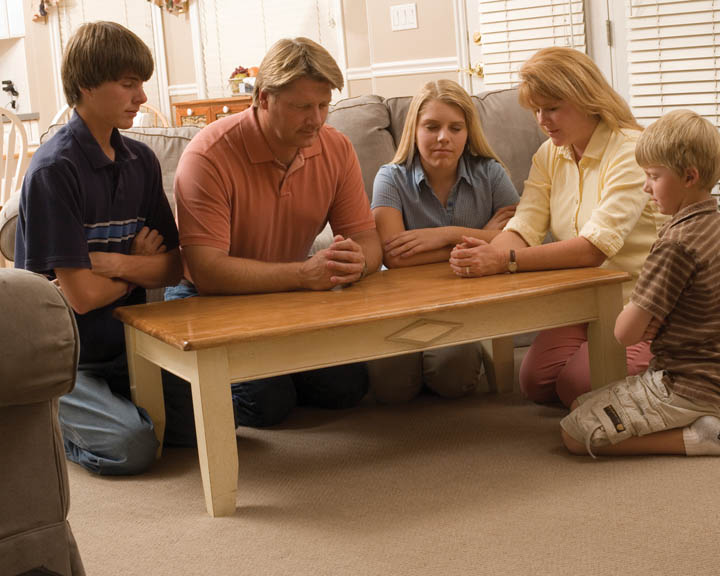This article first appeared on Latter-day Saint Woman.
When I was first investigating the Church in the 1970s, during the women’s movement’s height, the idea of the husband as head of the home bothered me. As I studied the issue, though, I realized I had my explanation for how it worked right in my own home.
 My parents were not LDS. My mother wanted me to be a feminist–and yet she lived a very traditional sort of life as a homemaker. However, it was fully her choice and she considered true feminism to be about being allowed to choose her role. She grew up in a single parent home, as did my father, and they wanted something else for their children. They wanted two parents in the home and one parent at home, since neither had had that. My mother wanted to be the mother at home–the mother she wished she’d had growing up.
My parents were not LDS. My mother wanted me to be a feminist–and yet she lived a very traditional sort of life as a homemaker. However, it was fully her choice and she considered true feminism to be about being allowed to choose her role. She grew up in a single parent home, as did my father, and they wanted something else for their children. They wanted two parents in the home and one parent at home, since neither had had that. My mother wanted to be the mother at home–the mother she wished she’d had growing up.
I never heard either of my parents describe my father as head of the household, but he clearly was. My mother cheerfully deferred to him on all important matters. Eventually, as I watched more closely, I figured out how it could be that a couple could have a head of household and still be an equal partnership.
Here’s how it works:
In my own home, my husband is over certain things and I am over others. Some, we’re over because we’re better at it. Sometimes it’s a matter of schedules–I’m not much of a cook, but I’m the one home when dinner needs to be cooked, so I cook. Sometimes, it’s just how things ended up and sometimes roles change around.
In general, we each fully control our area of expertise, but, of course, if something important comes along, we consult the other. I didn’t buy a new refrigerator until I talked to my husband about it due to the cost. (Of course, the old one broke while we were talking, which settled the matter.) He doesn’t decide to change jobs without consulting me. Those things affect us both, so we talk about them. We also help each other out. Sometimes he does the housework and I do the bookkeeping just because it works out that way. (Since I hate math, though, I try to avoid those kinds of situations.)
 In spite of that, I consider my husband to be the head of the house. As the prophets have often said, that means leading by example, not force. It means that most of the time, we make small decisions on our own for our own area of authority and discuss the big ones together. Usually, we just agree on those big things. If we don’t, I turn it over to my husband, who then nearly always does it my way. This is because, having the final decision, he feels it inappropriate to decide for himself unless he really has inspiration about it or just understands the situation better than I do. He has a very good understanding of the kinds of situations I am best at evaluating and the ones he is best at.
In spite of that, I consider my husband to be the head of the house. As the prophets have often said, that means leading by example, not force. It means that most of the time, we make small decisions on our own for our own area of authority and discuss the big ones together. Usually, we just agree on those big things. If we don’t, I turn it over to my husband, who then nearly always does it my way. This is because, having the final decision, he feels it inappropriate to decide for himself unless he really has inspiration about it or just understands the situation better than I do. He has a very good understanding of the kinds of situations I am best at evaluating and the ones he is best at.
So, the head of the household will hardly ever get his own way in a tie. I’m not sure why women are fighting to lose that privilege. (This is a joke, folks. I’ve learned people don’t know that.) It works out that way because of my husband’s respect for me, and that is something I learned to expect at home from my parents. My dad fully respected my mother’s wishes about anything she really cared about.
Now, this is how the patriarchal order works in the home. It is also how it works in the church. When I serve in a leadership position and the person over me is doing the calling properly, I have nearly full authority over the calling. I can’t do anything that is against the commandments or against current rules (and those rules are most often made by women). However, I can generally decide how I want things done. Yes, I check in with the person over me, but that’s how management structures work. As a Primary teacher, if I want to do something unusual, I check with the Primary president. When I was the literacy leader, I tried to get the Relief Society president to teach me how to set up and run the English as a Second Language program, because she was an ESL teacher by profession. Instead, she and the bishop chose to trust me to figure it out on my own. I did and they ran it my way. I made mistakes, and I’m sure they knew they were mistakes, but they let me make them and learn. When I was the Primary president, I was asked to observe and counsel the bishop on a situation that was his authority, but that he felt I could do better. He acted on my advice. He gave me that authority to counsel him–but not to make the final decision–because he felt impressed to do so when he prayed. However, it was then up to him to pray about my observations.
I have never, in a calling, had a leader try to run my calling for me. I’m not saying it never happens. I have always been fortunate in my leaders. However, I don’t think replacing a bad leader with a woman will end bad leadership. I grew up hearing that if women were in political office, there wouldn’t be wars. That hasn’t worked out very well, has it? The truth is that unrighteous dominion happens because of the personality, skill, and testimony of the specific person, and not because the leader is male or female. Women can do so as easily as men. In my first leadership opportunity, I was bossy. I hadn’t yet learned the difference, at age 18, between bossing and leading. I have now, of course.
The way a good marriage works–an equal partnership even when one person is the head–is how a calling should work. The arguments I hear for ordination that draw on unrighteous dominion simply don’t hold up because that leaves the impression that men are inherently less righteous than women and that is not true. It is, I think, a distraction from the debate.
In a properly run church, you choose good people through inspiration. You provide training. If they make mistakes, you either let them work it out themselves or counsel them, depending on the type of mistake or the type of person you are dealing with. In general though, you do as President Hinckley said about the women of the church–you get out of the way and watch all the good they can do. This is true of both men and women, I believe.
Being the leader is not being powerful. In a properly run church, only God has power. The rest of us are merely doing what He asks us to do. This is why it is unimportant to me who God chooses to lead or how he assigns the work.
Read the original story at Latter-day Saint Woman.
The late Terrie Lynn Bittner—beloved wife, mother, grandmother, and friend—was the author of two homeschooling books and numerous articles, including several that appeared in Latter-day Saint magazines. She became a member of the Church at the age of 17 and began sharing her faith online in 1992.







